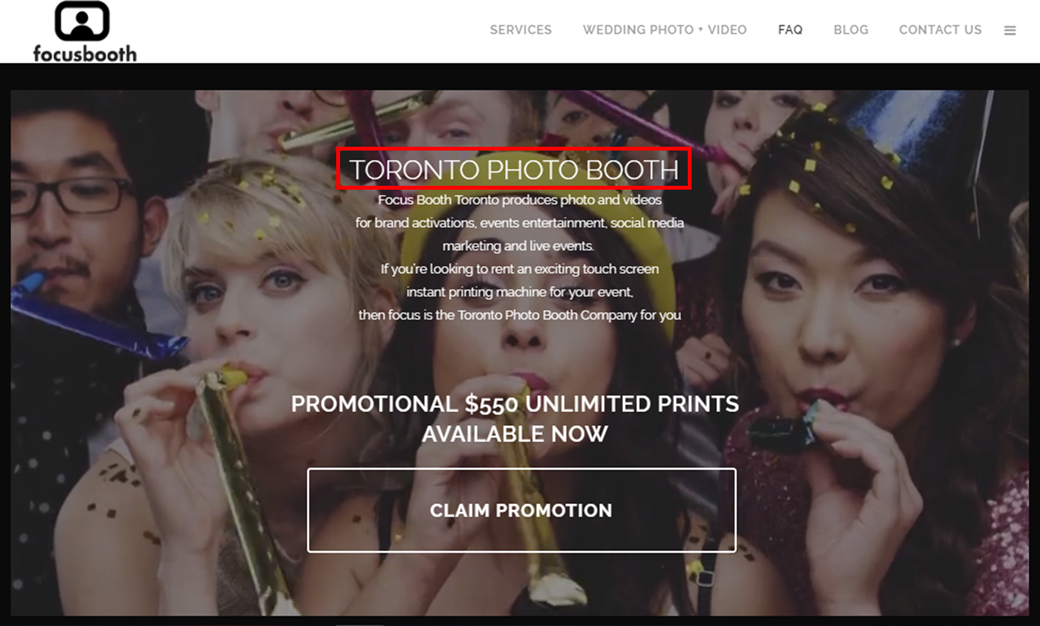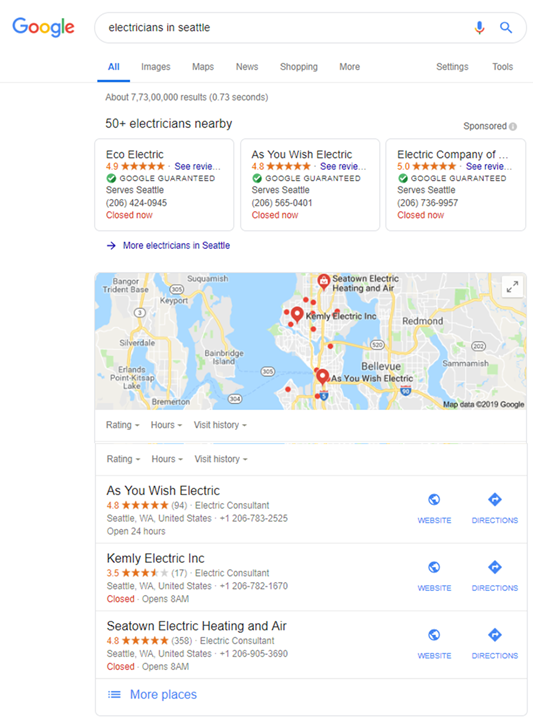Every business should have a local SEO strategy if they don’t want to miss out on high-intent qualified leads and this is especially crucial for local businesses who need to target people in their city or region.
The priority of local businesses is to secure high ranking positions in a particular location. With that said, it’s important to note that the nature of SEO is not stable, it keeps on changing. So, it would be best if you think of actionable and effective ways to strengthen your local SEO and secure high rankings.
When done correctly, local SEO can help you generate more high-quality traffic, leads, and conversions. In addition to this, it can also help you compete with big brands and stay relevant in the competition.
This post will guide you with four effective tactics to strengthen your local SEO strategy. Let’s get started.
1. Optimize your “Google My Business” page
One of the obvious yet the most important tactics to strengthen your local SEO strategy is to optimize your Google My Business page.
Listing your business with Google My Business makes it easier for people to discover your business. Once listed, your business will show up on Google Maps when users search for businesses like yours.
This will also help your business to rank better in search engine results. Your business can also appear on the sidebar of Google search results pages when Google verifies your business as legitimate. You should follow the below tips to optimize your Google My Business page and strengthen your local SEO:
- Perform a hygiene check to your Google My Business listing.
- Make sure that you provide detailed, accurate, and up-to-date information about your business.
- Add your business’ logo, relevant images, exact location, payment methods, the services or products you offer, and hours of operation.
- Encourage your customers to add their feedback and ratings.
- Always be quick to respond to your customer reviews.
These tips and tricks will help you strengthen your local SEO and generate more high-quality leads for your business.
2. Optimize your local business listings
Local directories are one of the most common places where users search for local businesses. So, you should add your business listings to all popular directories in your niche.
These directories often rank high in Google search results for local search queries. Anyone who checks these directories can be redirected to your website or business if you optimize your listings. This will not only help you increase your organic search traffic but will also help you get qualified leads.
Update the name, address, and phone section
These are the most important elements of your Google My Business listings because these will provide your contact details to potential customers. It is crucial that all of your details are accurate and updated, otherwise, you might lose potential, high-intent customers.
Also, ensure that there are no misspellings and avoid using abbreviations or anything confusing. If there is any change in your contact details, update all of your listings accordingly.
Also, ensure that these details are consistent across all listings. Otherwise, people might get confused and won’t know which one to trust.
3. Optimize your website content for local keywords
You should optimize your website content with keywords that are relevant to your local customers too.
You can use Google’s Keyword Planner to find relevant yet local keywords using the location filter. The tool can help you identify the most popular and relevant local keywords that you should target.
Once you have a list of local keywords, you should include them in your website content, meta descriptions, titles, and URLs.
However, you need to examine the competitiveness of your potential list of keywords before you use them. For this, you can use tools such as SpyFu to see if your competitors are also using these keywords. If the same keywords are strengthening your competitors’ local SEO, they might work well for you too.
However, a word of caution, never over-use keywords. That’s because keyword stuffing might make your website content seem spammy. Make sure that you evenly distribute your keywords throughout the content and add them in a way that they seem to fit in naturally.
For instance, Focus Booth, which is a famous photo booth in Toronto, uses their location-based keyword “Toronto photo booth” wherever possible.
As you can see in the screenshot below, they have mentioned the location of their business exactly at the center of their landing page. Similarly, their meta title also starts with the same local keyword.
 Source: Focus Booth
Source: Focus Booth
4. Ask your happy customers to give positive online reviews
Positive reviews influence 68% of consumers to use your local business?
This suggests that positive reviews can help you attract new customers. So, go ahead and ask your happy customers to share positive feedback. You should also encourage them to give good ratings to your business online.
91% of millennials trust online reviews as much as personal recommendations. So gaining positive reviews for your business online can help your brand appear as more trustworthy.
Always provide quality services to your customers. It will encourage them to become your brand advocates, write more positive reviews, and recommend your business to their friends and families.
Positive reviews can help you earn the trust of your target audience and drive more qualified leads. Here are some tips to motivate your customers to write good reviews for your business:
- Always make sure to ask for a review in person once a customer avails your services.
- You can also send them a text message or an email after the purchase, asking your customer to give a review.
- Always reply to customer reviews as soon as you read them. Thank your customers for positive reviews and encourage them to visit again.
If you receive a negative review, you should apologize for the discomfort and try to solve their problems politely and professionally. For instance, when you type “electricians in Seattle”, you can see a list of local businesses along with their ratings.
 Source: Google
Source: Google
4. Create a mobile-responsive website
The use of mobiles is increasing significantly, and so is the number of mobile searches. The credit goes to the increasing accessibility and availability of high-speed internet.
According to Statista, the expected number of mobile users will reach 4.68 billion in 2019.
52.2% of all website traffic came from mobile devices in 2018. Also, this percentage is likely to increase further.

Source: Statista
That’s why you need to design and develop responsive websites to improve user experience on mobile devices.
Using a responsive website design can help you get an edge over your competitors and can also improve your local SEO. You should follow the below tricks to create a mobile-responsive website:
- Always optimize your images and videos to reduce page load time.
- Carefully plan your website layout and navigation menus. Make sure that it is easier for visitors to find what they are looking for.
- Improve page load speed. If your web page takes longer to load, it will be unable to hold a user’s attention.
- Add social media sharing buttons to your product pages and blog posts. Make sure that it is easy for visitors to share your content in their circles.
You can use tools such as Google’s Mobile-Friendly Test to examine whether or not your website is mobile responsive. This tool can help you improve the mobile responsiveness of your site by providing you with valuable suggestions.

Source: Google
5. Strengthen your social media presence
Social media does have an impact on your presence in search engine results. Let’s discuss this in detail.
Establishing an excellent social media presence can help your brand to appear as more credible and trustworthy. Social media could also serve as a great source of backlinks and high-quality traffic.
You need to be very active on your social media handles. Proactively promoting your business on social media can help you increase your brand awareness and reach. This can help you attract more people to your brand, products, and/or services.
However, you should always post content that is relevant and useful to your audience. If they find your content valuable, they are more likely to follow you and visit your website. They can also share your content with their social networks.
Promoting your business on social media is an effective strategy to increase your brand’s visibility and traffic. It can also positively impact and strengthen your local SEO strategy in the long run.
Final thoughts
It is important to take time to develop an effective local SEO strategy. However, at the same time, it is also important to keep an eye on the recent SEO trends. That’s because the SEO industry is evolving fast.
You should always stay up-to-date about the latest SEO trends and capitalize on them to stay ahead in the competition.
Follow the actionable tactics we’ve discussed above to strengthen your local SEO strategy and rank higher in local searches.
Do you know of any other ways to improve your local SEO strategy? If so, please feel free to share them in the comments section.
The post The ultimate guide to strengthen your local SEO strategy appeared first on Search Engine Watch.
from SEO – Search Engine Watch http://bit.ly/2ZsPqof
via IFTTT

No comments:
Post a Comment